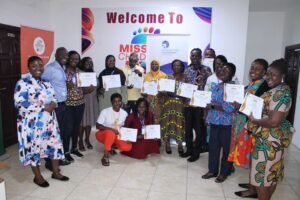Debunking the “Dumb” associated with dyslexia

Debunking the “Dumb” associated with dyslexia

Think for a moment about how society sometimes views people who struggle with reading. Have you ever witnessed or heard of individuals being labeled as “dumb” simply because they find it difficult to read or mix up letters?
Such unfair judgment perpetuates a deep-rooted stigma that affects individuals living with dyslexia. In Ghana, approximately 10% of the population may have dyslexia, a condition that has unfortunately been misunderstood, leading to stigmatization and unfair assumptions about those affected.
Understanding Dyslexia
Dyslexia is a specific learning disorder that affects language processing, particularly reading, writing, and spelling skills. It is important to emphasize that dyslexia has no connection to a person’s intelligence or overall cognitive abilities. Individuals with dyslexia often exhibit difficulties in accurately recognizing and manipulating letters and words. However, they may excel in other areas such as problem-solving, creativity, or critical thinking.
Dispelling the Myth of “Dumbness”
One of the most significant misconceptions surrounding dyslexia is the assumption that affected individuals are unintelligent or “dumb.”
This assumption is not only inaccurate but also harmful, as it undermines the potential and abilities of those with dyslexia. It is crucial to understand that dyslexia is a specific learning difference and does not determine a person’s intelligence or worth.
Supporting Individuals with Dyslexia
Recognizing that dyslexia is a learning difference rather than a measure of intelligence is essential for fostering inclusivity and providing appropriate support.
Individuals with dyslexia can benefit from specialized education and interventions tailored to their needs. With the right support, such as dyslexia-friendly teaching methods, assistive technologies, and individualized learning plans, individuals with dyslexia can thrive academically and lead fulfilling lives.
Promoting Awareness and Empathy
To create a more inclusive society, we must actively challenge the stigma associated with dyslexia. Raising awareness about dyslexia and educating the public can help dispel misconceptions and foster empathy.
By understanding that dyslexia is a common learning difference that affects people from all walks of life, we can promote a more compassionate and supportive environment for individuals with dyslexia.
Dyslexia should never be equated with “dumbness.” It is a specific learning difference that affects reading, writing, and spelling skills, while intelligence remains unaffected.
By breaking down the stigma associated with dyslexia and promoting understanding, we can ensure that individuals with dyslexia receive the support and opportunities they deserve. Let us strive for a more inclusive society that values the diverse abilities and potential of all its members.
By Wisdom Sarfo






